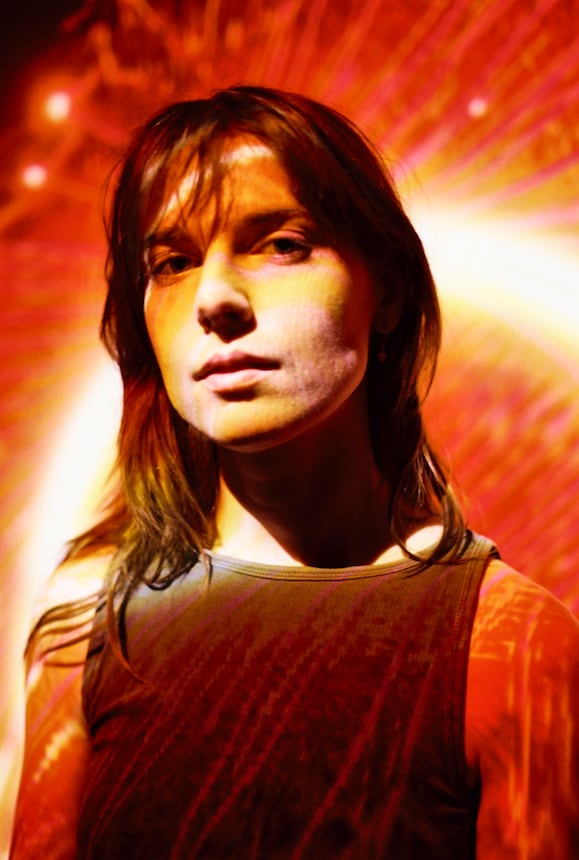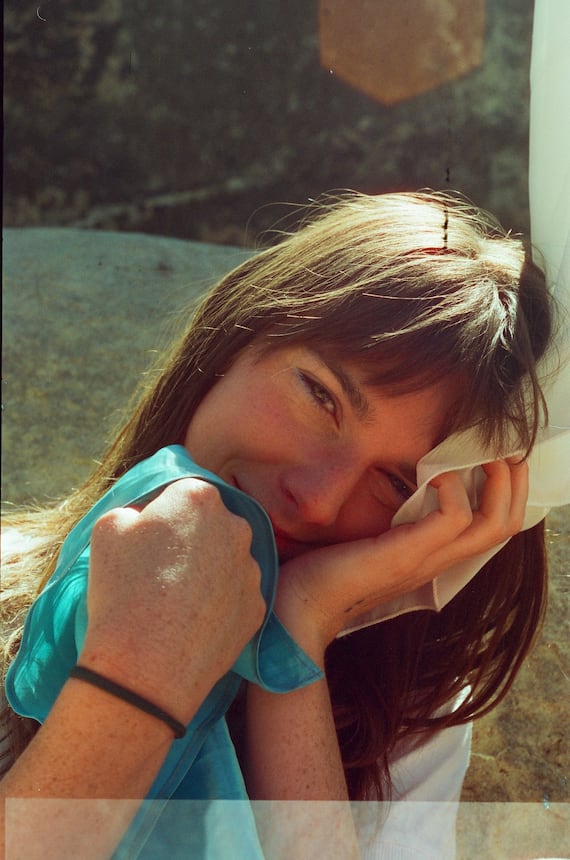Light, Dark, Light Again is the follow-up to Angie McMahon’s acclaimed 2019 debut Salt. Showing significant evolution in her musical and spiritual journey, Light, Dark, Light Again was created alongside co-producer Brad Cook, drawing inspiration from various locales, including Melbourne, regional Victoria, and Durham, North Carolina. We managed to catch this Qobuzissime winning artist whilst she was in Melbourne to chat all things creativity, spirituality and how to be vulnerable and authentic in a world on fire...
Did you expect Salt to blow up as much as it did?
I had no idea what to expect. Like I’d never put an album into the world before, and I think I didn’t even realise at the time how special the reception was, because that’s maybe something that I noticed more in retrospect. When I was in it, I was pretty overwhelmed and I was of like, oh, is this what it’s like for people? But now I have a slightly better perspective on it. You’ll never get back the feeling or the success that you experienced when you very first begin.
Did you feel like you were on some sort of time schedule to release a second album, or did you always have that kind of freedom?
I just felt like I was taking forever and I put a lot of pressure on myself. It took me a really long time to pull myself together and feel connected to what I was meant to be doing. And the people around me weren’t putting too much pressure on me because I think we all understood the world was on fire. I’ve been putting so much pressure on myself, I think since day one. I’m quite a perfectionist and I didn’t realise that before, but I realise it now, because I’m a perfectionist about things just being a certain way rather than being actually perfect, but I think I’ve actually struggled more with the self pressure.
The album’s themes delve into the intricacies of the human experience, exploring life’s harsh realities and the perennial quest for self-acceptance. McMahon’s lyrics touch on the impermanence of life, the challenges posed by late-stage capitalism, and the tumultuous journey of embracing oneself amid a chaotic world. Her songwriting delves into the deeply personal and the universally relatable, creating an intimate space where listeners can connect with her vulnerability

How have you combated the idea that as an artist you always have this feeling that you’re ‘running out of time’ and that self-pressure?
I mean, that’s like ongoing really (she laughs candidly). Like, I think I’m just determined to rebel against it. It seems like such a cultural trap, you know, and think it’s more relevant for women. Women tend to feel like all of these doors around us are closing and I kind of am just like, fuck those doors. The stronger that I am in my own values and living a life based on my values, I’m just like, oh, that stuff sucks but I don’t want to let it define me. The weight is so imaginary and it is made up by men… I wish that we weren’t making women invisible or older that they got. Our society is obsessed with infantilizing women and celebrating a season of our youth and then, like, throwing you to the dogs, and that is not something I believe in. I will challenge that.
How have you learned to let go of that perfectionism?
Yeah, it’s a journey of leaning into collaboration for me. Back then, I didn’t really know who I was as much, and didn’t feel so confident in who I was. And now that I just feel a little bit more confident in who I am, I’m trying to balance that out with a willingness to trust other people and trust the people that I choose to work with, that they’re going to show up authentically as well. I trust people more because I trust myself more… I know that if something really isn’t great or if I really can’t get behind something, I now also have the communication skills to hopefully talk about it and the discomfort of that conversation or the consequences of losing a bit of time or losing a bit of money or whatever. Trusting that you can try something and it might fail and it might be shit and you’ll be okay. Or also that it might be better and it might be greater because you tried it. Perfectionism feels like a bit of a prison where you don’t get to experience all the things you know you could.
I think that a lot of the record is kind of about that, it’s sort of like trying to encourage myself to take the hard road, to do the hard thing. Get closer to it. And love yourself in the process.
The album boasts an impressive lineup of musicians, including Bon Iver’s drummer Matt McCaughan, Canadian singer-songwriter Leif Vollebekk, and Phil Cook, forming a stellar studio band that brings McMahon’s vision to life.
Would you say a lot of this has come from honing your intuition and listening to your body, like trusting those feelings inside you?
Definitely. It’s also come from trusting that I’m going to be nice enough to myself at the end of the day. I know that if I make the wrong decision, I will hopefully be able to be compassionate enough to myself that it doesn’t hurt so much when I do… and I can take the lesson from it, you know, and kind of embrace whatever it was meant to teach me. I think that a lot of the record is kind of about that, it’s sort of like trying to encourage myself to take the hard road, to do the hard thing. Get closer to it. And love yourself in the process.
I often like the analogy of imagining a difficult task within a bubble – and within the membrane of that bubble, when you’re sitting with that uncomfortableness, that is when growth happens.
I love that. I also really like the visual of doors. The hardest thing is to go through the door and remember that when you’re on the other side, you’re still going to be yourself. And you’ll want to see whatever is on the other side, but you can’t see it until you go through that door.
Was there something in your life that triggered this new-found spiritual outlook on life?
It was honestly a really slow letting go of a particular relationship in my life, and it wasn’t a romantic one, which was almost more strange. Alongside it, I just had to realize that with that loss came so much beauty and so much understanding. Through it, I was learning so much about myself that I wouldn’t have learnt otherwise. I let go of the old version of me and I hit rock bottom, and at rock bottom, I found so much wholeness and so much possibility. This was the biggest experience of failure that I’ve ever had. And I’ve always been afraid of failure... It turns out failure teaches you a lot of stuff…

Light, Dark, Light Again is a sonic journey that seamlessly transitions between vulnerability and power. While her debut displayed directness and dynamism, this album takes a softer, more intimate approach, inviting the audience to explore her emotional landscape
In terms of what is happening in the world right now, “Mother Nature” is a beautiful track demonstrating what I mean, how do you balance being active and aware of these situations, but also finding a space to foster creativity in a world that’s on fire?
I mean, it’s really hard. Like, honestly, 20 minutes before this interview was sitting at the piano just playing. I hadn’t done that in a while, and I’ve been feeling really heavy this week and that was really helpful. I have a music practice and that’s always been the way that I’ve processed stuff. And I also feel like it’s my purpose… I also have to remind myself to stay connected to my community… Everything that I’ve ever learnt, it has been because of others, and nature. But yeah, I’d say just remember to leave solitude and to play and do music in a joyful way, not just for work.
Being a musician for work, or any artist really, is so strange. Music is so personal. One minute it is your whole soul and the next you have to turn it into a commodity – how do you detach yourself from this?
Honestly, it’s a lot. One minute I’m writing something and it feels very real and I’m like, ‘oh finally this feels authentic!’ Then my next thought is, ‘oh better record it… Like get out my phone, make sure I capture it etc, because this is now a product’. And I think that is kind of sad. I don’t mourn it too much, because I feel really lucky to be able to do these things. But it is weird. I don’t think people understand it… And I think that’s probably why it’s important to engage in other types of art or music, without it being a commodity.
Light, Dark, Light Again is a record that captures the dualities of life, reflecting the perpetual dance between light and dark, chaos and tranquility, and the unending cycles of existence. In the end, McMahon’s music reminds us that from darkness, there is always the potential for light to emerge, just as new beginnings follow every ending. Her album is a poignant testament to the ebb and flow of life’s beautiful complexities.

